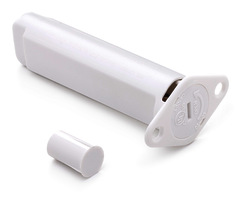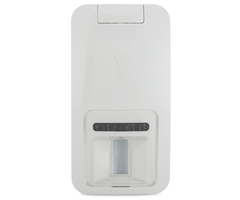Alarm System Sensors That We Wish Existed
Posted By Michael GorisSometimes we like to speculate about security system sensors and equipment that, for whatever reason, has yet to be announced for built by manufacturers. Today, we're going to discuss some sensor ideas that we wish existed in reality, but for now only remain ideas inside of our own heads.

Keep in mind that while these ideas may seem very plausible and realistic, they are still nothing more than ideas at this point. None of these ideas have been announced or mentioned by manufacturers, and it's likely that these concepts may never become a reality. This is just for fun, and we're merely floating around ideas. Don't get your hopes up and expect these sensors to be available on our website any time soon. And if you happen to be a manufacturer reading this, then take notes, as we think these products could be big hits.
PowerG Heat Sensor

The PowerG lineup is known for its excellent diversity, as it offers sensors of nearly all types. But one sensor that is noticeably absent from this lineup is a standalone heat sensor. We regularly get requests from Qolsys IQ Panel 2 Plus users who want a fire detection sensor for use in an area where a conventional smoke detector would be prone to false alarms. Such areas can include kitchens, garages, bathrooms, and attics.
We're pretty surprised that Johnson Controls hasn't produced a standalone heat sensor option for their PowerG lineup yet. It could be as simple as making it so that you can disable smoke detection on a dual-function smoke & heat sensor. This is already possible with the Honeywell SiXSMOKE, so we're sure this could be done for the DSC PG9936 as well. On that note, we would also love to see a PowerG equivalent to the Honeywell SiXCOMBO and finally give PowerG System users a truly complete life-safety sensor option with built-in smoke, heat, and carbon monoxide detection.
Honeywell SiX Series Recessed Contact

This is another one we're a little surprised isn't already a thing. While Resideo has been somewhat choosy about which sensor types to make available for the Honeywell SiX Series Lineup, most of the omissions are understandable. But the absence of a recessed door and window contact is a bit of a head-scratcher. Resideo has produced many wireless and wired recessed contacts in the past, so we're not quite sure why they would forget to make an encrypted option for the massively popular Lyric Controller. One theory we have its that they are afraid the wireless signal range would be too lackluster.
While quite not as popular as surface-mount contacts due to the hole-drilling that is required, recessed contacts are appreciated by many users who want an aesthetically pleasing install. It's not like Resideo doesn't already know this. We have seen them offer a wide selection recessed contacts in the past. The company previously went out of their way to make the Honeywell SiXMINICT after the standard Honeywell SiXCT was deemed by many to be too bulky. For now, Lyric users remain stuck using non-encrypted devices like the Honeywell 5818MNL if they want to add recessed door and window contacts to their systems.
Qolsys Dual-Tech Motion Sensor

We've gotten the impression in recent times that Qolsys isn't really making their 319.5 MHz S-Line Sensors a top priority, as they instead seem to be focusing on producing the best security panels possible. The most popular sensors for all versions of the Qolsys IQ Panel 2 Plus are the PowerG Sensors, which are sold under the DSC banner. And it's very telling that the upcoming Qolsys IQ Hub is expected to only support PowerG Sensors and forgo legacy frequencies entirely. But that doesn't mean that Qolsys 319.5 MHz Sensors don't have their merits, and we think that a Qolsys Dual-Tech Motion Sensor would be quite useful.
A dual-tech motion sensor uses both passive infrared (PIR) and microwave detection technology to sense movement. This is opposed to a standard motion sensor that just uses PIR. The advantage to a dual-tech motion is that both its PIR sensor and its microwave sensor must be triggered before the sensor will activate. This can be crucial for false alarm prevention. Dual-tech motions are also known to offer pet immunity, which is often a major selling point for those with dogs and cats. We have seen dual-tech motion sensors made for many different security systems, and users typically have a decent selection to choose from.
But you're a bit out of luck if you need a 319.5 MHz wireless dual-tech motion, as Qolsys never seemed to make one. That's a bit of a letdown, especially considering that the 319.5 MHz version is the most popular model of the IQ Panel 2 Plus. At least the DSC PG9984P remains an option for that system, as well as any other system that can support PowerG.
More Fall Detection Sensors

Nortek Control changed the game for medical alert sensors when they introduced the 2GIG F1-345 Personal Safety Pendant with fall detection technology. Qolsys soon followed suit with their own Qolsys IQ Fall Pendant. Both of these sensors have built-in accelerometers for detecting the rapid change in movement that occurs during a slip and fall accident. They also retained the capability of a traditional medical alert button, as a user can press and hold the button to alert the system during an emergency. We thought that emergency fall sensors would become the next big thing.
But oddly enough, the development of new fall detection sensors seems to have stalled. We have yet to Resideo try their hand at a fall sensor with an accelerometer. The same is true for a potential release for the PowerG lineup from DSC. We're not quite sure what the hold up is, as the offerings from 2GIG and Qolsys have proven to be quite successful. Some members of our team have also proposed the idea of having these sensors send a second alert to the system if a prolonged period of no movement occurs following a detected fall, as such a scenario may indicate that the individual has seriously hurt themselves. There has also been talk of using rechargeable batteries for these devices, in order for the sensor to work for a longer time period before a battery replacement is needed.

Right now, these sensors are just ideas. But the best idea of all is to sign-up for alarm monitoring! Alarm Grid offers monitoring plans for all needs and budgets. We recommend checking our monitoring page for more information. If you are interested in getting started, please email us at support@alarmgrid.com. We check our email from 9am to 8pm ET M-F. We look forward to hearing from you!





